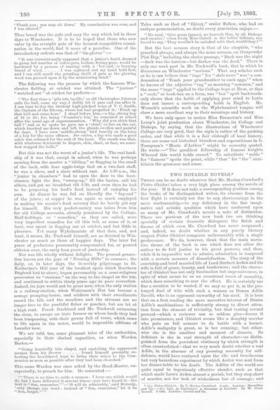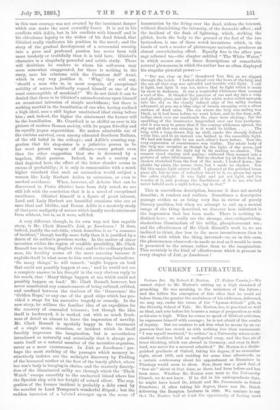TWO NOTABLE NOVELS.*
THERE can be no doubt whatever that Mr. Marion Crawford's Pietro Ohieleri takes a very high place among the novels of the year. If it does not take a corresponding position among the books of its distinguished writer, its absence from the first flight is certainly not due to any, shortcomings in the mere workmanship,—to any deficiency in the fine imagi- native and artistic qualities which have conferred upon so many of Mr. Crawford's novels a note of distinction. There are portions of the new book (*e are thinking specially of certain dramatic dialogues) the finish and finesse of which even Mr. Crawford has never surpassed ; and, indeed, we doubt whether in any purely literary respect Pietro Ghisleri compares unfavourably with a single predecessor. We do, however, think that the main narra- tive theme of the book is one which does not allow the author to do full justice to his great powers; and thus, while it is impossible not to admire, admiration is tempered with a certain measure of dissatisfaction. The story of the courtship and brief married life of Lord Herbert Arden and hie, wife is full of grace, beauty, and tenderness ; and the charac- ter of Ghisleri has not only fascination but impressiveness, in spite of what seems to us an occasional touch of unreality, which does something to mar the effect. He is certainly too fine a creation to be wasted, if we may so put it, in the pro- longed duel of wits with such a woman as Donna Adele Savelli, who is an opponent unworthy of his steel. It is true that on a first reading the mere narrative interest of Donna AdMe's machinations is sufficiently strong to divert atten- tion from the element of triviality, but that testing second perusal—which a reviewer can so seldom give—forces it into prominence, and Ghisleri seems like a doughty warrior who puts on full armour to do battle with a hornet. Adele's malignity is great, so is her cunning; but other- wise she is the smallest and meanest of sinners. So deficient is she in real strength of character—as distin- guished from the persistent obstinacy by which strength is often counterfeited—that we very much doubt whether a real Adele, in the absence of any pressing necessity for self- defence, would have ventured upon the vile and treacherous but very hazardous experiment by which Arden was sent from her dinner-table to his death. The Adeles of the world are quite equal to ingeniously effective slander, such as that which made Laura Arden almost a pariah, but they stop short of murder, not for lack of wickedness but of courage; and * (1.) Pietro Glitioleri. By F. Marion Crawford. 8 vols. London : Macmillan and Co.—(2.) List, los Landsmen I a Romano. of Incident. By W. Clark Russell. 8 vols. London : Cassell and 0a. in this case courage was not created by the imminent danger which can make the most cowardly brave. It is not in his conflicts with Adele, but in his conflicts with himself and in his chivalrous loyalty to the widow of his dead friend, that Ghisleri really vindicates his position in the novel ; and the story of the gradual development of a reverential worship into a pure and profound passion has never been told more tenderly or truthfully than it is told here. Ghisleri's character is a singularly powerful and subtle study. There will doubtless be readers to whom his self-scorn may seem somewhat exaggerated, for there is nothing in the story, save his relations with the Countess dell' Armi, which in any way justifies it. Why,' they will say, 4 should a man who is, in most respects, of exceptional nobility of nature, habitually regard himself as one of the most contemptible of mankind P' We do not think it can be denied that there is in Ghisleri's animadversions upon himself an occasional intrusion of simple morbidness ; but there is nothing morbid in the humiliation of one who, having realised a high ideal, sees a still higher unattained ideal rising before him ;. and, indeed, the higher the attainment the keener will be the humiliation. Mr. Crawford is as skilful as ever in his picture of modern Roman society, with its pagan frivolity and its equally pagan superstition. He makes admirable use of the curious survival, even among educated Southern Italians, of the old belief in the evil-eye ; and Adele's cunning sug- gestion that his step-sister is a jettatrice proves to be her most potent weapon of offence,—more potent even than the other suggestion that she is devoured by a hopeless, illicit passion. Indeed, in such a society as that depicted here, the effect of the latter slander seems in excess of probability ; it is only in communities with a much higher standard that such an accusation would subject a woman like Lady Herbert Arden to ostracism, or even to marked avoidance. When, however, all defects that can be discovered in Pietro Ghisleri have been duly noted, we are still left with the conviction that it is a novel of exceptional excellence. Ghisleri himself is a figure of great interest, Lord and Lady Herbert are beautiful creations who are at once ideal and lifelike, and Donna Adele is a masterly study of that pure malignity of nature which hardly needs nutriment from without, but is, as it were, self-fed.
A very different though, in its own way, not less capable story, is Mr. Clark Russell's List, ye Landsmen ! It does, indeed, justify the sub-title, whioh describes it as "a romance of incident," though hardly more fully than it is justified by a dozen of its author's previous works. In the matter of sheer invention within the region of credible possibility, Mr. Clark Russell has no living English rival ; and to the ordinary lands- man, his fertility seems all the more amazing because it exploits itself in what seem to him such cramping limitations. So many things,' he will remark, ' might happen on land that could not possibly happen at sea ; ' and he would not see a complete answer to his thought in the very obvious reply to his words, that Many things happen at sea which could not possibly happen on land.' Mr. Clark Russell, however, has never manifested any consciousness of being cabined, cribbed, and confined between the timbers of the Grosvenor,' the Golden Hope,' or any one of the good ships which has pro- vided a stage for his narrative tragedy or comedy. In the new story, he utilises the familiar idea of an expedition for the recovery of concealed treasure ; but though the idea itself is hackneyed, it is worked out with so much fresh- ness of detail as almost to leave the impression of novelty. Mr. Clark Russell is specially happy in the treatment of a single scene, situation, or incident which in itself forcibly impresses the imagination, but is nevertheless introduced so naturally and artistically that it always pre- sents itself as a natural member of the narrative organism, never as a mere excrescence. In List, ye Landsmen ! per- haps the most striking of the passages which memory in- stinctively isolates are the midnight discovery by Fielding of the bereaved mother at the foot of the lonely gibbet, where her son's body is banging in chains, and the masterly descrip- tion of the illuminated milky sea through which the Black Watch' sweeps smoothly to the uncharted island where lies the Spanish ship with her freight of coined silver. The sug- gestion of the former incident is probably a debt owed by the novelist to Lord Tennyson's wonderful Eispah ; but the sudden intrusion of a belated stranger upon the scene of lamentation by the living over the dead, widens the interest, without diminishing the intensity, of the dramatic effect ; and the incident of the flash of lightning, which, striking the gibbet, hurls the body to the ground at the feet of the two bystanders, is one of those weird inventions which, in the hands of such a master of picturesque narration, produces an almost overwhelming effect. Equally fine is the other pas- sage referred to,—the chapter entitled " The White Water," in which occurs one of those descriptions of remarkable natural phenomena in which the author has so often displayed his singular pictorial power :— "`Der sea vhas on fire !' thundered Yan Bol, as we slipped through the hatch. I looked ahead over the bows of the brig, and the sea all that way was splendid and terrible with light. I call it light, but light it was not, unless that be light which is made by snow in darkness. It was a wonderful whiteness that seemed a sort of fire. It blended the junction of sea and sky into a wide and ghastly glare, and the light of the white water rolled upwards into tho sky as the clearly defined edge of the milky surface advanced, as you see a blue edge of breeze sweeping over a silver surface of dead calm. The sea where the brig was sailing was black, as it had been before we went below, and in the deep, soft, indigo dusk over our mastheads the stars were shining ; but the sparkling of the luminaries languished over our fore yardarms, and it was easy to guess that if the coming whiteness spread, the sky and all that was shining in it would be hidden The brig, with a long-drawn flap up aloft, smote the sharply defined white line, and in an instant was bathed in the unearthly light. We had not been able to see each other's faces before. Now the very expression of countenance was visible. The whole body of the brig was revealed as though by the light of the moon, and the ghastliness of the light lay in its making no shadow. The seamen stood staring and gaping : withered they seemed into a posture of utter lifelessness. But no shadow lay at their foot, no shadow stretched from the foot of the mast ; I looked down ; the planks lay plain, the seams clear, but I made no shadow. Nor did this magic light mirror itself. I glanced at the polished brass piece aft, but no star of reflection burnt in it, no gleam lay upon the cabin skylight. It was light and yet not light, and the wonder of it, and perhaps the fearfulness of it to ins, who had never beheld such a sight before, lay in that."
This is marvellous description, because it does not merely describe ; it renders and realises. Sometimes a descriptive passage strikes us as being very fine in virtue of purely literary qualities, but when we attempt to call up a mental image of the thing described, we discover how indistinct is the impression that has been made. There is nothing in- distinct here ; we really see the strange, star-extinguishing, shadowless illumination of the milky, phosphorescent sea ; and the effectiveness of Mr. Clark Russell's work is, we are inclined to think, due less to the mere inventiveness than to the skill with which the thing invented—or, as in this case, the phenomenon observed—is made as real as it would be were it presented to the senses rather than to the imagination. This certainly is the kind of effectiveness whioh is present in every chapter of List, ye Landsmen !



































 Previous page
Previous page